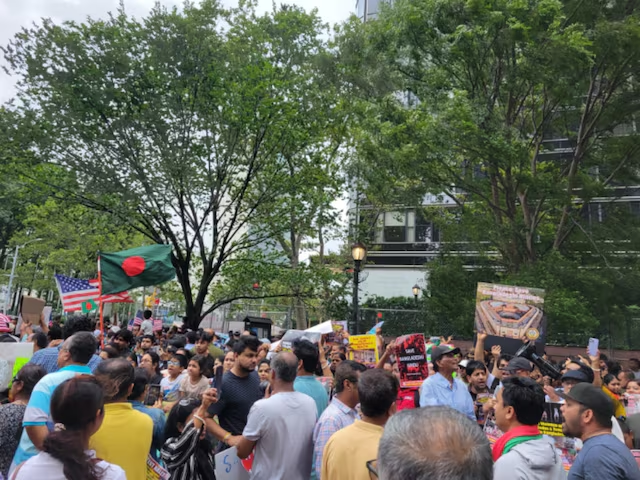
Protest Outside UN HQ Over Attacks on Hindus in Bangladesh
Background
The recent attacks on Hindus in Bangladesh have drawn significant international attention, prompting protests outside the United Nations Headquarters. These demonstrations come in response to a series of violent incidents targeting the Hindu community in Bangladesh, which have resulted in loss of life, property damage, and widespread fear among the community.
Details of the Protest
Table of Contents
- Protestors’ Demands:
- The protest outside the UN Headquarters was organized by various human rights and Hindu advocacy groups. Demonstrators gathered to voice their concerns about the escalating violence in Bangladesh and to demand international intervention.
- The primary demands included immediate action to ensure the safety of Hindus in Bangladesh, a thorough investigation into the attacks, and accountability for those responsible.
- Speeches and Statements:
- Speakers at the protest highlighted the severity of the situation, emphasizing the need for urgent international attention and support. They criticized the lack of adequate response from both the Bangladeshi government and the international community.
- The protestors also called for increased pressure on the Bangladeshi authorities to take concrete steps to protect minority communities and address the root causes of the violence.
- Impact and Reactions:
- The protest garnered significant media coverage and drew attention to the plight of Hindus in Bangladesh. It served as a platform for advocates and community leaders to raise awareness and seek international support.
- The UN and various member states received the protest’s message and were urged to take a more active role in addressing the crisis.

Congressman Krishnamoorthi’s Involvement
- Call for Action:
- Congressman Raja Krishnamoorthi, representing Illinois, has been a vocal advocate for addressing the crisis in Bangladesh. He has called for decisive action to protect the Hindu community and ensure justice for the victims.
- In his statements, Krishnamoorthi emphasized the need for the US government to work with international partners to address the situation and provide support to those affected.
- Legislative Efforts:
- Krishnamoorthi has proposed legislative measures aimed at addressing human rights abuses and supporting affected communities. These efforts include pushing for sanctions on individuals or entities involved in the violence and advocating for humanitarian assistance to Bangladesh.
- His legislative actions also involve working with other lawmakers and international organizations to create a coordinated response to the crisis.
- Public Statements:
- In public statements and interviews, Congressman Krishnamoorthi has highlighted the importance of standing up for religious freedom and protecting minority communities. He has called for the international community to exert pressure on the Bangladeshi government and ensure that justice is served.
Broader Implications
- Human Rights Concerns:
- The attacks on Hindus in Bangladesh raise significant human rights concerns, highlighting the vulnerability of religious minorities in the region. The international community’s response will be crucial in addressing these concerns and preventing further violence.
- Diplomatic Relations:
- The crisis has implications for diplomatic relations between Bangladesh and other countries, including the United States. The way the situation is handled could affect international relations and influence future diplomatic interactions.
- Support for Minority Rights:
- The protests and legislative efforts underscore the broader issue of minority rights and religious freedom. The international community’s response will be closely watched, and the outcome could set a precedent for addressing similar crises in the future.

Next Steps
- International Response:
- The UN and other international bodies are expected to take further steps in response to the crisis. This may include issuing statements, increasing diplomatic pressure, and providing humanitarian assistance.
- Monitoring and Advocacy:
- Ongoing monitoring of the situation and continued advocacy efforts will be essential in ensuring that the needs of affected communities are addressed. Support from human rights organizations, lawmakers, and the public will play a critical role in driving positive change.
- Engagement with Bangladeshi Authorities:
- Engaging with Bangladeshi authorities and encouraging dialogue will be important in finding a resolution to the crisis. Ensuring that the concerns of minority communities are addressed and that accountability is upheld will be key to achieving long-term stability.







